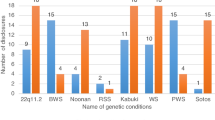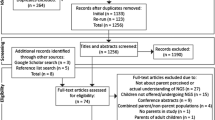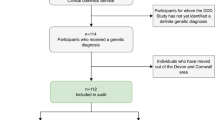Abstract
Klinefelter syndrome (KS) is a common genetic condition that is currently under-diagnosed. The phenotype is broad, with physical, medical and psychosocial features ranging from mild to severe. When a child is diagnosed with KS, the parents may spend months to years searching for a diagnosis. This study used a qualitative methods approach to explore parents’ experiences of having a child with KS and receiving a diagnosis. Fifteen semistructured one-to-one in-depth interviews were conducted to explore their experiences and views. The interviews were then transcribed, coded and thematically analysed. The interviews revealed that parents had diverse experiences related to: the timing of the diagnosis of their child and reasons why their child was investigated for KS; the information that was provided at the time of diagnosis; the supports that were available and the concerns that parents held for the future of their child. The conclusions from this study were that parents’ experiences of having a child with KS and receiving a diagnosis were complex and multifaceted. This experience was shaped by the timing of when the diagnosis was received, who provided the diagnosis, what information was provided from health-care professionals and that which parents may have encountered on the internet. The long-term experiences for parents were also impacted by the level of support they received. These findings have implications for the process by which KS is recognised by the health-care community and supports available for families.
Similar content being viewed by others
Log in or create a free account to read this content
Gain free access to this article, as well as selected content from this journal and more on nature.com
or
References
Herlihy AS, Halliday JL, Cock ML, McLachlan RI : The prevalence and diagnosis rates of Klinefelter syndrome: an Australian comparison. Med J Aust 2011; 194: 24–28.
Rey RA, Gottlieb S, Pasqualini T et al: Are Klinefelter boys hypogonadal? Acta Paediatr 2011; 100: 830–838.
Boada R, Janusz J, Hutaff-Lee C, Tartaglia N : The cognitive phenotype in Klinefelter syndrome: a review of the literature including genetic and hormonal factors. Dev Disabil Res Rev 2009; 15: 284–294.
Zinn AR, Ramos P, Elder FF, Kowal K, Samango-Sprouse C, Ross JL : Androgen receptor CAGn repeat length influences phenotype of 47,XXY (Klinefelter) syndrome. J Clin Endocrinol Metab 2005; 90: 5041–5046.
Bojesen A, Juul S, Gravholt CH : Prenatal and postnatal prevalence of Klinefelter syndrome: a National Registry Study. J Clin Endocrinol Metab 2003; 88: 622–626.
Herlihy AS, McLachlan RI, Gillam L, Cock ML, Collins V, Halliday JL : The psychosocial impact of Klinefelter syndrome and factors influencing quality of life. Genet Med 2011; 13: 632–642.
Fennoy I : Testosterone and the child (0–12 years) with Klinefelter syndrome (47XXY): a review. Acta Paediatr 2011; 100: 846–850.
Bojesen A, Høst C, Gravholt CH : Klinefelter's syndrome, type 2 diabetes and the metabolic syndrome: the impact of body composition. Mol Hum Reprod 2010; 16: 396–401.
Bojesen A, Juul S, Birkebæk N, Gravholt CH : Increased mortality in Klinefelter syndrome. J Clin Endocrinol Metab 2004; 89: 3830–3834.
Bojesen A, Juul S, Birkebæk NH, Gravholt CH : Morbidity in Klinefelter syndrome: a Danish Register Study based on hospital discharge diagnoses. J Clin Endocrinol Metab 2006; 91: 1254–1260.
Bojesen A, Gravholt CH : Klinefelter syndrome in clinical practice. Nat Clin Pract Urol 2007; 4: 192–204.
Geschwind DH, Boone KB, Miller BL, Swerdloff RS : Neurobehavioral phenotype of Klinefelter syndrome. Ment Retard Dev Disabil Res Rev 2000; 6: 107–116.
Leggett V, Jacobs P, Nation K, Scerif G, Bishop DVM : Neurocognitive outcomes of individuals with a sex chromosome trisomy: XXX, XYY, or XXY: a systematic review. Dev Med Child Neurol 2010; 52: 119–129.
Turriff A, Levy HP, Biesecker B : Prevalence and psychosocial correlates of depressive symptoms among adolescents and adults with Klinefelter syndrome. Genet Med 2011; 13: 966–972.
Herlihy AS, Gillam L, Halliday JL, McLachlan RI : Postnatal screening for Klinefelter syndrome: is there a rationale? Acta Paediatr 2011; 100: 923–933.
Morris JK, Alberman E, Scott C, Jacobs P : Is the prevalence of Klinefelter syndrome increasing? Eur J Hum Genet 2007; 16: 163–170.
Bojesen A, Stochholm K, Juul S, Gravholt CH : Socioeconomic trajectories affect mortality in Klinefelter syndrome. J Clin Endocrinol Metab 2011; 96: 2098–2104.
Whitmarsh I, Davis AM, Skinner D, Bailey DB Jr : A place for genetic uncertainty: parents valuing an unknown in the meaning of disease. Soc Sci Med 2007; 65: 1082–1093.
Carmichael B, Pembrey M, Turner G, Barnicoat A : Diagnosis of fragile-X syndrome: the experiences of parents. J Intellect Disabil Res 1999; 43: 47–53.
Fredheim T, Lien L, Danbolt LJ, Kjønsberg K, Haavet OR : Experiences with general practitioners described by families of children with intellectual disabilities and challenging behaviour: a qualitative study. BMJ Open 2011; 1: 1–7.
Rosenthal ET, Biesecker LG, Biesecker BB : Parental attitudes toward a diagnosis in children with unidentified multiple congenital anomaly syndromes. Am J Med Genet 2001; 103: 106–114.
Pieters J, Kooper A, Eggink AJ et al: Parent’s perspectives on the unforeseen finding of a fetal sex chromosomal aneuploidy. Prenat Diagn 2011; 31: 286–292.
Crotty M : The Foundations of Social Research: Meaning and Perspective in the Research Process 1st edn London: SAGE Publications, 1998.
Robinson A : Phenomenology; In: Cluett ER, Bluff R, (eds).: Principles and Practice of Research in Midwifery. Churchill Livingstone Elsevier, 2006, pp 187–202.
Wong SH Diagnosing Duchenne muscular dystrophy and parents’ views on screening: a Victorian perspective. Advanced Medical Science (AMS) thesis, University of Melbourne, Melbourne 2011.
Charmaz K : Constructing Grounded Theory: A Practical Guide through Qualitative Analysis 1st edn London: SAGE Publications, 2006.
Shaw J, Dunn S, Heinrich P : Managing the delivery of bad news: an in-depth analysis of doctors’ delivery style. Patient Educ Couns 2012; 87: 186–192.
Salander P : Bad news from the patient's perspective: an analysis of the written narratives of newly diagnosed cancer patients. Soc Sci Med 2002; 55: 721–732.
Peel E, Parry O, Douglas M, Lawton J : Diagnosis of type 2 diabetes: a qualitative analysis of patients’ emotional reactions and views about information provision. Patient Educ Couns 2004; 53: 269–275.
Young S, Bramham J, Gray K, Rose E : The experience of receiving a diagnosis and treatment of ADHD in adulthood: a qualitative study of clinically referred patients using interpretative phenomenological analysis. J Atten Disord 2008; 11: 493–503.
Van Engelen K, Baars MJ, van Rongen LT, van der Velde ET, Mulder BJ, Smets EM : Adults with congenital heart disease: patients' knowledge and concerns about inheritance. Am J Med Genet A 2011; 7: 10.
Denschlag D, Tempfer C, Kunze M, Wolff G, Keck C : Assisted reproductive techniques in patients with Klinefelter syndrome: a critical review. Fertil Steril 2004; 82: 775–779.
Gruchy N, Vialard F, Decamp M et al: Pregnancy outcomes in 188 French cases of prenatally diagnosed Klinefelter syndrome. Hum Reprod 2011; 26: 2570–2575.
Mansfield C, Hopfer S, Marteau TM : Termination rates after prenatal diagnosis of Down syndrome, spina bifida, anencephaly, and Turner and Klinefelter syndromes: a systematic literature review. Prenat Diagn 1999; 19: 808–812.
Marteau T, Nippert I, Hall S et al: Outcomes of pregnancies diagnosed with Klinefelter syndrome: the possible influence of health professionals. Prenat Diagn 2002; 22: 562–566.
Visootsak J, Ayari N, Howell S, Lazarus J, Tartaglia N : Timing of diagnosis of 47,XXY and 48,XXYY: a survey of parent experiences. Am J Med Genet A 2013; 161: 268–272.
Bailey DB, Skinner D, Hatton D, Roberts J : Family experiences and factors associated with the diagnosis of fragile X syndrome. J Dev Behav Pediatr 2000; 21: 315–321.
Abramsky L, Hall S, Levitan J, Marteau TM : What parents are told after prenatal diagnosis of a sex chromosome abnormality: interview and questionnaire study. BMJ 2001; 322: 463–466.
Borelli JB, Bender BG, Puck MH, Salbenblatt JA, Robinson A : The meaning of early knowledge of a child's infertility in familes with 47,XXY and 45,X children. Child Psychiatry Hum Dev 1984; 14: 215–222.
Quine L, Rutter DR : First diagnosis of severe mental and physical disability: a study of doctor–parent communication. J Child Psychol Psychiatry 1994; 35: 1273–1287.
Hill V, Sahhar M, Aitken MA, Savarirayan R, Metcalfe S : Experiences at the time of diagnosis of parents who have a child with a bone dysplasia resulting in short stature. Am J of Med Genet A 2003; 122: 100–107.
Skotko BG, Levine SP, Goldstein R : Having a son or daughter with Down syndrome: perspectives from mothers and fathers. Am J Med Genet A 2011; 155: 2335–2347.
Acknowledgements
We acknowledge the parents who participated in this study, without whom this work would not be possible. Also, all individuals at the Murdoch Childrens Research Institute and Monash University who helped bring this study to completion, especially Dr Ned Douglas. This work was supported by the Victorian Government's Operational Infrastructure Support Program.
Author information
Authors and Affiliations
Corresponding author
Ethics declarations
Competing interests
The authors declare no conflict of interest.
Additional information
Supplementary Information accompanies this paper on European Journal of Human Genetics website
Supplementary information
Rights and permissions
About this article
Cite this article
Bourke, E., Snow, P., Herlihy, A. et al. A qualitative exploration of mothers’ and fathers’ experiences of having a child with Klinefelter syndrome and the process of reaching this diagnosis. Eur J Hum Genet 22, 18–24 (2014). https://doi.org/10.1038/ejhg.2013.102
Received:
Revised:
Accepted:
Published:
Issue date:
DOI: https://doi.org/10.1038/ejhg.2013.102
Keywords
This article is cited by
-
Communication of the diagnosis to Klinefelter subjects: an observational study on a key moment of the patient’s life
Journal of Endocrinological Investigation (2024)
-
Communicating the diagnosis of Klinefelter syndrome to children and adolescents: when, how, and who?
Journal of Community Genetics (2022)
-
The Impact of Living with Klinefelter Syndrome: A Qualitative Exploration of Adolescents and Adults
Journal of Genetic Counseling (2017)
-
Attitudes of parents of Klinefelter boys and pediatricians towards neonatal screening and fertility preservation techniques in Klinefelter syndrome
European Journal of Pediatrics (2016)
-
A mixed methods study of age at diagnosis and diagnostic odyssey for Duchenne muscular dystrophy
European Journal of Human Genetics (2015)



